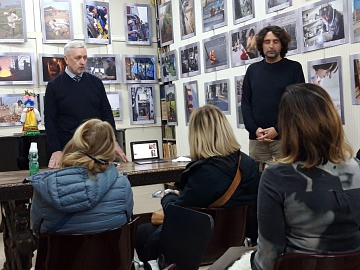Professor Yury Chernyshov gave a lecture in Naples at the invitation of the Massimo Gorki Cultural Association
 The capital of Campania Naples has been the most important center of interaction between Russian and Italian cultures for more than one century. Many famous writers, painters and artists who came from Russia found sources of creative inspiration here. For example, since 1906 Maxim Gorky lived on the island of Capri and in Sorrento, in memory of whom the current Association of Culture Maxim Gorky (L'Associazione Culturale Massimo Gorki) is named. The association promotes the Russian language and culture in Italy, cooperates with Russian universities and cultural institutions.
The capital of Campania Naples has been the most important center of interaction between Russian and Italian cultures for more than one century. Many famous writers, painters and artists who came from Russia found sources of creative inspiration here. For example, since 1906 Maxim Gorky lived on the island of Capri and in Sorrento, in memory of whom the current Association of Culture Maxim Gorky (L'Associazione Culturale Massimo Gorki) is named. The association promotes the Russian language and culture in Italy, cooperates with Russian universities and cultural institutions.
On January 16, in Naples, at the invitation of this association, with an open lecture (translated into Italian), Head of the Department of General History and International Relations of Altai State University Professor Yury Chernyshov. The topic of the lecture was related to his doctoral dissertation, defended at St. Petersburg State University: "The myth of the golden age in ancient Rome".
Neapolitans are generally keenly interested in ancient Roman history. The city has a wonderful archaeological museum, and near Naples, on the other side of Vesuvius, there are impressive paintings of excavated Pompeii, Herculaneum and Stabiae - cities that were buried in 79 by a volcanic eruption.
Antiquity, as the Neapolitans themselves emphasize, is always next them.
Opening the event, Head of the association, Senator Luigi Marino, noted that this meeting with a Russian historian should become another link in the development of their cooperation.
Professor Yury. Chernyshov told the audience about the results of his research - about how the archaic myth of the "golden race" had gone a difficult path of evolution towards various utopias of the "golden age" and their use in political propaganda. The imperial slogan of the coming "golden age" for some time helped the authorities of Rome to rally a huge power. More than 16 emperors, following Augustus, announced the time of their reign as a new "golden age". In the end, however, the victory was won by a completely different, Christian version of the idea of a better future - the idea of the "millennial kingdom". The "rivalry of utopias" continues to the present time: utopias flare up, then fade, but never completely disappear from public consciousness. The author's conclusions aroused great interest among the audience: more than a dozen questions were asked regarding the role of myths and utopias in history and in the modern world. As a result, the meeting was evaluated as very interesting and useful.
The professor donated one of the editions of his book to the library of the University of Naples L'Orientale.
During the trip, they discussed the possibilities of continuing cooperation with Italian colleagues in the field of conferences and scientific publications.